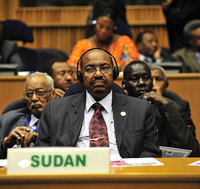First there was Hugo Chavez in Venezuela. Then there was Mahmoud Ahmadinejad in Iran. And now there is Omar al-Bashir in Sudan.
In many ways, this is no surprise. President Barack Obama pledged during his campaign that he would, unlike his predecessor, engage in talks with even the country's most ominous adversaries. In April at the Summit of the Americas, when the president ran into Chavez, the moment made for a remarkably smiley photo opportunity. No such meeting has occurred with the Iranian president, but intense negotiations have resulted in a possible breakthrough in the standoff over Tehran's nuclear program. So far for the president, dealing with tyrants has resulted in a net gain.
But Bashir? The 65-year-old despot who rules Sudan is arguably even further beyond the pale than the rest. Upon being indicted for war crimes by the International Criminal Court in July 2008, he promptly expelled some 13 relief agencies from the country, and then went dancing. Literally. The Bush administration accused him publicly of genocide -- as did the ICC, among other things. And with the possible exception of the humanitarian and war-torn disaster that is the Democratic Republic of the Congo, the last five years in Sudan have been the bloodiest and most cold-blooded in all of Africa.

